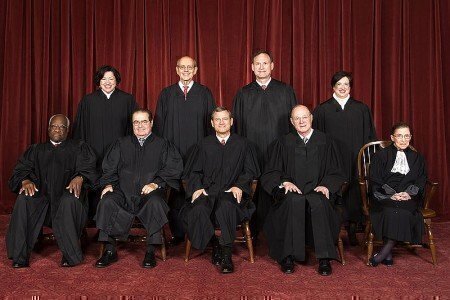Lyle Denniston, the National Constitution Center’s adviser on constitutional literacy, looks at how and when the Supreme Court will deal with four cases related to same-sex marriage.
“We recognize this litigation has caused uncertainty and disruption and have accordingly tried to expedite its resolution as quickly as possible by filing our petition a full month-and-a-half before the September 23rd due date.”
– Utah Attorney General Sean Reyes, in a statement on Tuesday as lawyers for the state filed their appeal in the Supreme Court to defend the state’s ban on same-sex marriages.
“It has long been clear that the Supreme Court will likely have the final word. I want that decision to come as soon as possible and I want the voices of Virginians to be heard. This case has moved forward at an incredibly swift pace.
– Virginia Attorney General Mark H. Herrin, in a statement on Tuesday announcing that state officials will file their Supreme Court appeal on the issue on Friday of this week. Although Virginia officials believe their ban is unconstitutional, they are continuing to enforce it while it remains intact and thus they want certainty about its validity.
WE CHECKED THE CONSTITUTION, AND…
Under America’s Constitution and federal laws, the Supreme Court, of all of the courts in the country, has the most freedom to choose when it is ready to take on a case, and which lawsuit it is willing to hear on any given issue. However, review by the Justices of the same-sex marriage question has become almost inevitable as lower court after lower court over the past 13 months ruled on the issue. The pace of decisions – and the unanimity of the result, against the bans -- are probably unprecedented for a major constitutional question.
It has also become very clear that there will be a race to the courthouse in Washington, with competing lawyers hoping to get their case put on the docket as the best one for the court to use to confront the constitutional power of states to ban same-sex marriage. Utah has won the race to be first, filing a petition for review on Tuesday, and Virginia will not be far behind, with a plan to file on Friday. Lawyers for county clerks in Oklahoma and Virginia have promised that they, too, will be submitting appeals before long.
At this point, with the Justices still in their summer recess and not due back in town until late September, the chances are that there will be no action on any of the appeals for several more weeks, at a minimum. Assume, then, that on their return, the Justices confront a minimum of four cases from which to choose. How to choose: what issues, and what case or cases?
The court has already given some clues. One of those came in late 2012, when it agreed to hear an appeal filed by the defenders of California’s “Proposition 8” ban on gay and lesbian marriages. That was a clear signal that the core issue – can a state impose such a ban without violating the Constitution? – is of genuine interest to the Justices. But that case washed out without a decision in June a year ago, because the court ruled that the defenders of “Proposition 8” had no legal right to pursue their appeal.
Another clue came in June of last year, in the court’s 5-4 decision in U.S. v. Windsor. Although the court majority insisted it was saying nothing in that case (which had to do with a federal law, the Defense of Marriage Act) about state power to ban same-sex marriage, the language of the main opinion was conspicuously sympathetic to claims of discrimination against already married same-sex couples and the children in such families. That ruling amounted to a definite hint that, when the right state case came along, the Justices probably would be ready to deal with it.
And the court has given other clues this year, when it twice issued temporary orders to block lower court rulings against same-sex marriage bans from going into effect. It did so at the request of state governments, indicating that the Justices have some sympathy for the sovereign interests of the states to have this constitutional controversy played out in an orderly way. At the same time, the court or a single Justice on two occasions refused to act on pleas by others than state governments to put same-sex marriages on hold. That was a definite indication that the court is going to take state requests more seriously in this area of the law.
Thus, the clues add up to this: the court is not likely to let the core issue slide much beyond the early part of their new term starting in October, it is more likely to take on a case appealed by a state than by someone else (such as a single county clerk), and it probably will want to confront the two basic issues that are at stake.
Those basic issues are: does the Constitution forbid a state to define marriage as between one man and one woman, and does the Constitution forbid a state from refusing to recognize same-sex residents performed elsewhere for residents of the state?
Both the Utah case, already at the court, and the Virginia case, arriving later this week, pose both of those questions. And they are appeals by state officials, looking for resolution of a fundamental constitutional question that affects the lives of many of their constituents.
But predicting how the court will react is fraught with uncertainty. Because the Justices have such wide discretion, they need not step into this controversy yet, and they do not even have to explain it if they just let it develop further for a time. Even so, they, too, recognize the signals that they have been sending.








